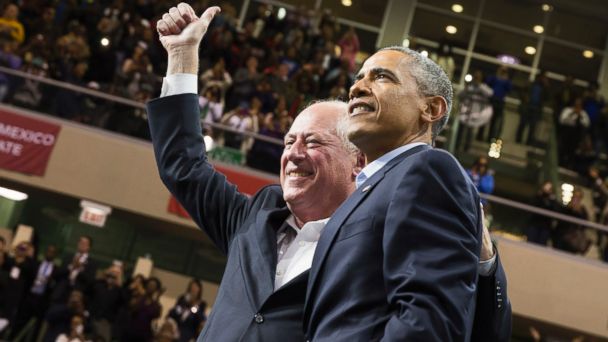Obama Hits Career Lows in Favorability, Empathy

Evan Vucci/AP Photo
Favorable views of Barack Obama and the sense that he understands the problems of average Americans both have dropped to career lows in the latest ABC News/Washington Post poll, two more unwelcome results for the president's party near the eve of the midterm elections.
Just 44 percent now see the president favorably, a basic measure of personal popularity - compared with 49 percent in late January and 60 percent at the start of his second term. Half of all adults see him unfavorably, as do 53 percent of likely voters.
See PDF with full results, charts and tables here.
Additionally, a career-low 46 percent say Obama understands the problems of people like them, with similar numbers on the strength of his leadership (rated positively by 46 percent), managerial skills (45 percent) and the extent to which he can be trusted in a crisis (49 percent).
Obama's lack of popularity has cast a shadow over his party as it tries to hang on to its majority in the Senate. His job approval rating hit a career-low 40 percent in an ABC/Post poll in mid-October, and was 43 percent last week. Historically, presidential approval correlates highly with midterm losses for an incumbent president's party.
It could be worse for the president in this poll, produced for ABC by Langer Research Associates. While his favorability rating has slipped by five points this year, the number who see him unfavorably has held steady, at 50 percent. More instead are undecided or have no opinion.
Obama's ratings on individual attributes are similar among likely voters - off his scores among the general public by 2 to 6 points. Just four in 10 think he's a strong leader or good manager; 45 percent trust him in a crisis and 44 percent say he understands their problems.
Current crises from ISIS to the Ebola virus may further test views of the president's leadership and management. And his weakness on understanding Americans' problems may be a particular challenge not just for his party but for the remainder of his presidency; empathy is the cartilage that can give a president some cushioning in tough times. It also was an essential element of his re-election in 2012.
GROUPS - The largest decline in Obama's overall favorability rating this year has occurred among Hispanics, down 19 points, perhaps reflecting his decision to delay executive action on immigration reform until after the midterms. Seven in 10 Hispanics viewed Obama favorably in January, compared with half now. Four in 10 saw him "strongly" favorably, vs. 15 percent now.
For comparison, Obama's favorability rating is 85 percent among blacks - down 9 points this year - and just 34 percent among whites, essentially unchanged.
Among partisan and ideological groups, his favorability ranges from eight in 10 Democrats to half of moderates and four in 10 independents, and bottoms out at 13 percent of Republicans and strong conservatives.
The president's rating is tied to views of the economy, the top issue for Americans in the midterms. Among those who say the economy is excellent or good, eight in 10 view Obama favorably, vs. 44 percent of those who say it's "not so good" and just 12 percent who say it's in poor shape.
There are similar partisan and ideological divisions on the other characteristics tested in this survey. Among others, nine in 10 or more blacks say each of the positive attributes applies to Obama, vs. about half of Hispanics and four in 10 or fewer whites. And younger adults tend to have more positive views of Obama; it declines among middle-aged adults and falls even lower among seniors.
Women - who are more apt to be Democrats - are more likely than men to say Obama understands people like them and he can be trusted in a crisis. And people with incomes less than $50,000 per year are more likely than their counterparts to see Obama as a strong leader, a good manager and trustworthy in a crisis.
METHODOLOGY - This ABC News/Washington Post poll was conducted by telephone Oct. 23-26, 2014, in English and Spanish, among a random national sample of 1,204 adults, including landline and cell-phone-only respondents. Results have a margin of sampling error of 3 points, including the survey's design effect.
The survey was produced for ABC News by Langer Research Associates of New York, N.Y., with sampling, data collection and tabulation by Abt-SRBI of New York, N.Y.